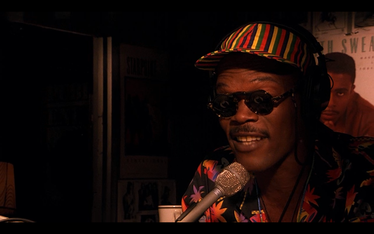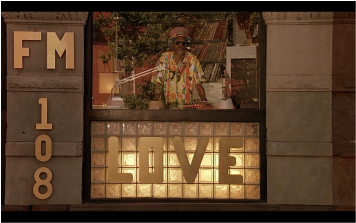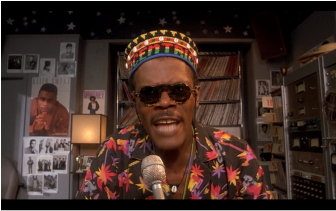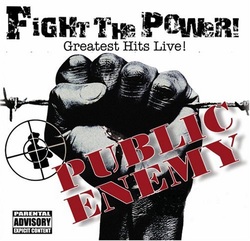Do The Right Thing : Belief & Postmodernism
Mister Señor Love Daddy

Mister Señor Love Daddy (Played by Samuel L. Jackson) serves as the radio personality for the the Bedford-Stuyvesant section of Brooklyn. Although he doesn't have much speaking time, he is the most heard out of any of the characters in the movie. Everyone listens to him and he is the "all-knowing" character. He watches as a third-party outsider and sees every person on the main street. He tells the weather and the news from outside of the town and serves as an overall messenger for everyone in the film.
The radio personality never even leaves his office, which also brings along the observation that he is the only black man who isn't Mookie that is working on this day. The only time that he ever makes an interaction with the other characters is when Mookie delivers his lunch to him.
"My people, my people, what can I say; say what I can. I saw it but didn't believe it; I didn't believe what I saw. Are we gonna live together? Together are we gonna live?"
The Radio personality is an example that compliments Brian McHale's postmodern theology of the existence of ontology, the nature of being. Of course people can see him from his station giving the news and his own opinion, but never does he actually participate in the actions that start up the conflicts. Several important scenes take place, the cops coming after the fire hydrant is released, the scene where Buggin Out decrees that everyone should riot Sal's Pizza, and when everyone trashes Sal's restaurant.
Mookie goes back to Tina's house in the middle of his shift. Tina is the mother to Mookie's child, Hector. The two end up making love during Mookie's visit and while the radio is playing, the Radio personality announces the beginning of "the cool-out corner." The music and the action taking place coincide with each other perfectly, as if the Radio personality was there the entire time. Is he actually there? McHale's thesis of entology is questioned because he exists but not in Mookie's life.
"Yes, children, this is the cool-out corner. We're slowing it down for all the lovers in the house. I'll be giving you all the help you need. Musically, that is."
"WE LOVE ROLL CALL, Y'ALL! Boogie Down Productions, Rob Base, Dana Dane, Marley Marl, Olatunji, Chuck D, Ray Charles, EPMD, EU, Alberta Hunter, Run-D.M.C., Stetsasonic, Sugar Bear, John Coltrane, Big Daddy Kane, Salt-n-Pepa, Luther Vandross, McCoy Tyner, Biz Markie, New Edition, Otis Redding, Anita Baker, Thelonious Monk, Marcus Miller, Branford Marsalis, James Brown, Wayne Shorter, Tracy Chapman, Miles Davis, Force MDs, Oliver Nelson, Fred Wesley, Maceo, Janet Jackson, Louis Armstrong, Duke Ellington, Jimmy Jam, Terry Lewis, George Clinton, Count Basie, Mtume, Stevie Wonder, Bobby McFerrin, Dexter Gordon, Sam Cooke, Parliament-Funkadelic, Al Jarreau, Teddy Pendergrass, Joe Williams, Wynton Marsalis, Phyllis Hyman, Sade, Sarah Vaughn, Roland Kirk, Keith Sweat, Kool Moe Dee, Prince, Ella Fitzgerald, Dianne Reeves, Aretha Franklin, Bob Marley, Bessie Smith, Whitney Houston, Dionne Warwick, Steel Pulse, Little Richard, Mahalia Jackson, Jackie Wilson, Cannonball AND Nat Adderley, Quincy Jones Marvin Gaye, Charles Mingus AND Marion Williams. We wanna thank you all for makin' our lives just a little brighter here on We Love Radio!"
Bel Hook's curiosity to the assimilation of Black culture and postmodernism is perfectly represented in the Radio personality's above quote over the radio, paying respect to all the rap and R&B artists that have made it big and influenced American culture. Hooks describes rap as it's own kind of postmodern movement. She writes, "They must assert power and privilege within the space of critical writing to open up the field so that it will be more inclusive. To change the exclusionary practice of postmodern critical discourse is to enact a postmodernism of resistance" (Hooks 630). The Radio personality's belief on the dependence of rap and R&B is postmodern because he idolizes these singers for their breakthrough from censorship and desire to express outside-the-lines thoughts.



